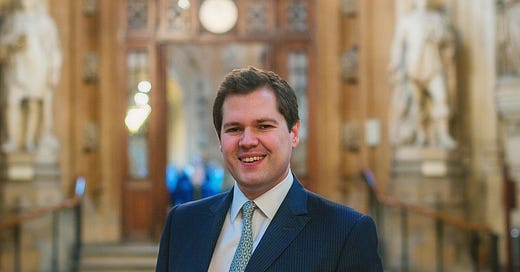Robert Jenrick accepts donations from loss-making company - AGAIN
New transparency data also reveals how Labour Together has become the party’s “first SuperPac”
Robert Jenrick is among the frontrunners for the Conservative leadership. The former immigration minister is currently the bookie’s favourite to win.
Jenrick has been at pains to appeal to the right of the Tory party. He has vowed to leave the European Court of Human Rights and woo back Reform voters.
He even gave a speech at the Heritage Foundation - the uber-conservative US think tank behind Project 2025 - earlier this year and was recently forced to backtrack after saying that any protester who shouts “Allahu Akbar” should be arrested.
The man once dubbed ‘Robert Generic’ because of his putatively middle-of-the-road politics has also raised more money so far than all of his Tory leadership rivals combined.
Jenrick declared £137,000 in donations in the latest register of MPs interests (published late on Friday. The perfect time to avoid prying eyes….)
Among Jenrick’s supporters is a small company called the Spott Fitness Ltd, which gave the would-be Tory leader two donations of £25,000 each in July.
There’s something curious about the Spott Fitness: since being incorporated in December 2020, the company has never turned a profit.
Its most recent accounts show that the company - which is owned by lawyer Mark Dembovsky - has no employees and net current liabilities of £330,000.
The Electoral Commission has previously called for electoral law to be changed so companies can only donate from UK profits.
It’s not the first (or even the second) time that Jenrick has taken money from a loss-making firm in recent months. As this newsletter revealed in May, Jenrick accepted £40,000 from two companies that were not making a profit in the UK, including a firm owned by Israeli billionaire Idan Oder.
Jenrick was ultimately forced to amend his register of interests after he took money from a dormant company.
So how could Spott Fitness afford to give £50,000 to Jenrick if the company had made no money? A spokesperson told me that the business “was still at the growth stage” but that “we measure success based on health outcomes not just simply profit versus loss accounting.”
The Spott Fitness spokesperson added “we’re excited to support leaders like Robert Jenrick who share our vision of businesses having purpose beyond just shareholder profit” and stressed that the firm is a permissible donor under electoral law.
That’s all well and good but doesn’t answer the question of where the money came from.
Jenrick was no more forthcoming. He never responded to this newsletter’s questions.
As Transparency International’s Steve Goodrich previously told us: “That it can be so hard to identify where corporate donors' money comes from shows there's something seriously wrong with the rules.”
Like the Electoral Commission, Goodrich thinks “businesses should only be able to donate if they can cover these costs from profits generated in the UK”. Democracy for Sale agrees.
Jenrick’s other challengers for the Tory leadership seem to be struggling to raise money. James Cleverly and Mel Stride registered no donations. Onetime security minister Tom Tugenhat declared just £2,000, from longtime Conservative donor Lord Michael Spencer for the use of a car to campaign.
Kemi Badenoch - widely seen as Jenrick’s closest challenger for the right-wing vote - declared £20,000, including £10,000 from Neil Record “in support of my campaign for the leadership of the Conservative Party.”
Record is better known to Democracy for Sale readers as ‘life vice president’ of the dark money-funded Institute of Economic Affairs - Liz Truss’s favourite think tank - and as a funder of the climate denying Global Warming Policy Foundation.
Is Badenoch courting the Tufton Street vote?
I wanted to tell you about The Conversation's weekly politics newsletter. It is the place to get political insight from people who really know what they're talking about. Every article is written by academic experts on their specialist subject. This means that their politics coverage gives you access to hidden trends, thought-provoking research findings and thoughtful discussions you won't find anywhere else. Best of all, it's free! Sign up here.
The latest register of interests - kudos to our friends at mySociety for producing a spreadsheet version - provided some other interesting disclosures. Nigel Farage, it transpires, is paid almost £1.2million a year by another loss-making company, GB News.
The register also revealed the huge amounts of cash given to new MPs by Labour Together. The think tank formerly run by Starmer’s political strategist, Morgan McSweeney (below), which is funded by private donors, gave almost £900,000 towards the general election campaigns of 106 MPs.
As the Guardian noted, the donations, of typically either £5,000 or £10,000, went predominantly to candidates not already in parliament. Only seven MPs held their seats prior to the election.
Labour Together has not just been giving money to prospective MPs. In the past year, it has also paid for the provision of staff or research services to 10 ministers, including Rachel Reeves, Yvette Cooper and David Lammy.
It also emerged yesterday that former Labour Together alumni Jess Sargeant has been given a senior role at the heart of the Cabinet Office - which begs a lot of questions about how Labour is making public appointments. (A party donor was also recently appointed to a senior role in the Treasury.)
As I recently wrote on here and in the London Review of Books, Labour Together’s growing influence has raised concerns among some in Labour. (My LRB piece is also discussed in Monday’s episode of Tortoise’s ‘the News Meeting’ podcast.)
Former MP Jon Cruddas, who was once a leading light in Labour Together, compared the organisation to the secretive groups that bankroll US politics. Certainly the latest financial disclosures suggest that Labour Together is living up to Cruddas’s description of it as “Labour’s first SuperPac” when he spoke to me.
Democracy for Sale will continue to dig deep to expose the dark money behind our politics. If you aren’t already, become a paid subscriber to support our work.






Deja vu ….
Peter, why doesn’t the electorial commission dig a bit deeper…?